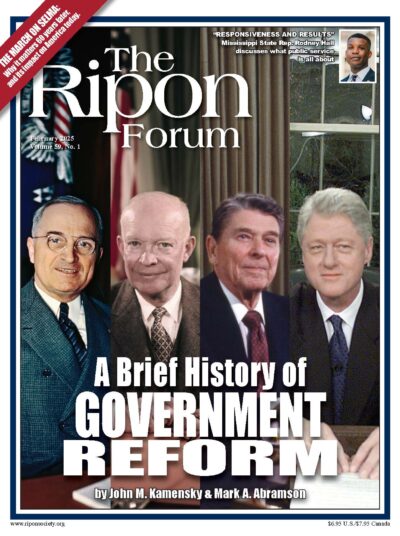
Yes, the bureaucracy in Washington is a clogged-up tangle. That’s why two-thirds of Americans think it needs a major overhaul, and why there’s so much excitement about the Department of Government Efficiency (DOGE) led by Elon Musk.
But slashing away at Washington’s many stupidities won’t fix much — like trying to prune a jungle. The way to drain the swamp is to pull the plug on its flawed operating philosophy — the post-1960s red tape compliance model. Americans are swimming in red tape. Is your paperwork in order?
A simpler governing framework of goals and principles will be far better than trying to prescribe the details of implementation. The Constitution — 7,500 words long — works pretty well. By contrast, today’s system of federal rules, procedures, and other red tape — 150 million words of binding law and regulation — mainly achieves legal gridlock.
DOGE has focused on cutting WHAT government does — say, $100 million F-35 fighter planes that can be destroyed by a $500 drone. But most failures of government are because of inept implementation — HOW government does it. Infrastructure permitting delays, for example, can more than double the cost of projects and cause environmental harm by prolonging polluting bottlenecks. Defense Department procurement red tape results in inferior products at high prices with years of delay. Procedural mandates for healthcare, schools, and employers are like legal quicksand, suffocating common sense throughout American society.
Making government work sensibly is not rocket science — replace the red tape jungle with a simpler framework activated by human responsibility. Focus on results, not mindless compliance.
Making government work sensibly is not rocket science — replace the red tape jungle with a simpler framework activated by human responsibility. Focus on results, not mindless compliance. Getting anything done requires judgment on the spot. “Nothing that’s any good works by itself,” as Thomas Edison put it. “You got to make the damn thing work.”
Governing by results would return to the principles-based framework that was in place, more or less, from 1789 until the 1960s. Law would provide boundaries that define the scope of an official’s authority. Within legal boundaries, officials would have the job to make governing choices, accountable to superiors and, ultimately, to voters. The 1956 Interstate Highway Act was 29 pages long, and within ten years 21,000 miles had been built. Today, it takes years to get approval for one stretch. A simpler, results-oriented framework also liberates citizens from thousand-page rulebooks and years of process to get permits.
But there’s one catch — civil servants must be accountable. Letting officials take responsibility for results means they must answer to superior officials and, ultimately, to elected officials. This is how democratic government is supposed to work — a chain of accountability that ends at the ballot box.
It’s little wonder that democracy no longer functions. Accountability has largely vanished in the federal government — 99 percent of federal employees are rated “fully successful.” Poor performers are practically impossible to fire, even when caught spending their days surfing porn sites. Originally intended to be a merit system, civil service has become an entitlement —protected by layers of red tape and union collective bargaining rights.
President Trump has re-instated a new “Schedule F” to make the most senior civil servants employees at will. But Schedule F does nothing to empower senior civil servants to manage the thousands of junior civil servants below them. Elaborate legal procedures require a supervisor, for example, to prove in a grievance proceeding that Mr. X doesn’t try hard, or abuses his authority. How does a supervisor prove a bad attitude or poor judgment?

Accountability is essential not only to remove poor performers, but also to instill pride and responsibility in public culture. Mutual trust is difficult when everyone knows performance doesn’t matter.
Accountability is essential not only to remove poor performers, but also to instill pride and responsibility in public culture. Mutual trust is difficult when everyone knows performance doesn’t matter. “We note deep disaffection within the public service,” the 2003 Volcker Commission concluded. “They resent the protections provided to those poor performers among them who impede their own work and drag down the reputation of all government workers.” Like obsolete infrastructure, America’s civil service framework should be largely scrapped. Numerous reform proposals have gone nowhere because of union opposition.
Trump’s Schedule F points the way to a bolder approach — to start remaking civil service by executive order. Article II of the Constitution provides that “The executive Power shall be vested in a President.” Numerous rulings by the Supreme Court have limited Congress’s ability to impinge on “executive power” regarding personnel judgments. Under these rulings, a president could disavow key aspects of civil service law, including:
— elaborate disciplinary procedures that make it impractical to terminate, discipline, or even give an honest job performance evaluation;
— the statutory mandate to collectively bargain with unions; and,
— the mechanistic hiring procedures that drive away good candidates.
By executive order, the president could create a genuine merit system. The new system should aim to inspire trust, not fear. Giving officials responsibility for results will attract qualified applicants who want to make a difference. Giving supervisors responsibility to make accountability judgments will inspire mutual trust that all are held to the same standard. Protecting against unfair personnel decisions can be achieved not by legal trials, but by giving oversight authority to an independent inspector or committee.
Congress will continue to kick the can down the road until forced to act. By asserting the constitutional powers of the executive, the president can provoke a constitutional challenge to be decided by the Supreme Court. Remaking civil service by executive order might also prod Congress into a long overdue modernization of the operating machinery of government.
Until then, the main products of Washington will be paralysis and waste.
Philip K. Howard is a longtime leader of government and legal reform in America. He is Chair of Common Good and has advised both parties on needed reforms. He is also a bestselling author whose latest book, Everyday Freedom, was reviewed by the Forum last year.




